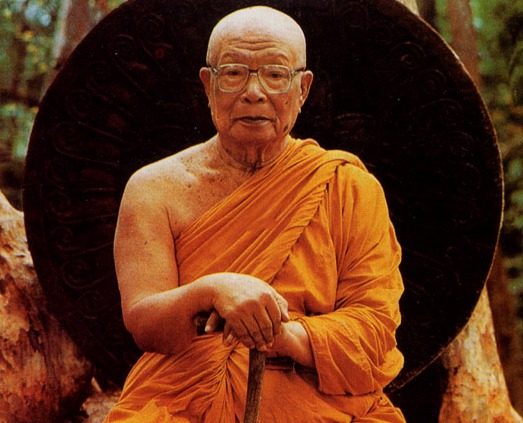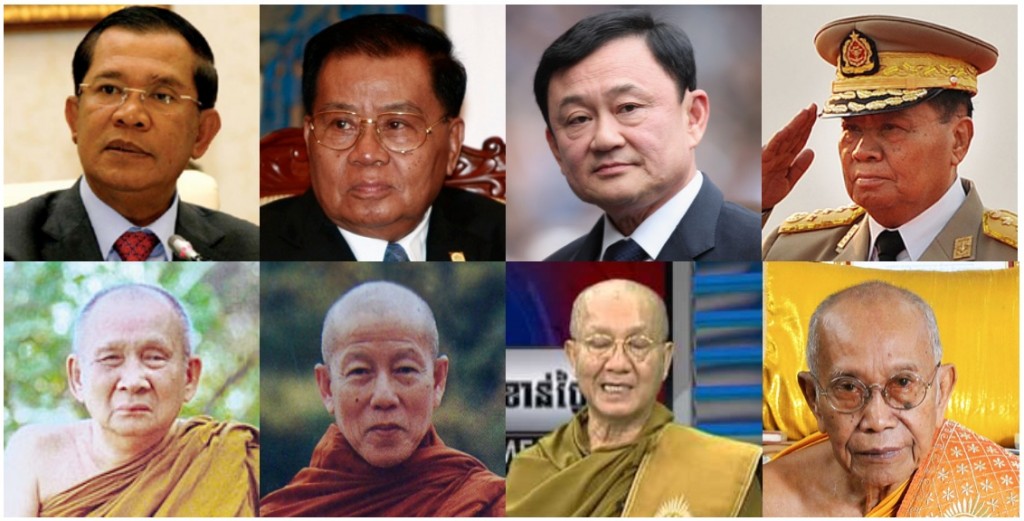I recently spoke with a professor who was inviting me to join a graduate level program. When he asked what I’d like to write a thesis about, I gave an honest and unrehearsed answer: “Well, I’m open-minded, but I want all of my research to really be connected to political and economic reality.”
He was surprised at this response: isn’t everything in Asian Studies connected to contemporary reality in this way? Well, no, not in my experience, and my experience is partly clouded by Buddhist Studies, and partly by a generational emphasis on literature, cinema and cultural studies.
Many people ask me why there isn’t more research (or, simply, more talk) about the connection between Buddhism and politics –and, of course, they mean in English. Why indeed.
In Thailand, the career of Thaksin Shinawatra began in the expressly-Buddhist Palang Dharma Party (р╕Юр╕ер╕▒р╕Зр╕Шр╕гр╕гр╕б), and his links to Buddhism (both orthodox and heterodox) were important to every stage of his career thereafter. If I search the archives of the Journal of the International Association of Buddhist Studies (J.I.A.B.S.), I cannot find a single appearance of the name Shinawatra.
The name of Hun Sen, also, has not appeared in this journal even once.
Given the tremendous importance of these two names alone, it is really worth asking: where would we find the discussion of their influence on Buddhism (in contemporary Southeast Asia), and, reciprocally, where would we find an evaluation of the influence of Buddhism on their own political careers? With many years of experience reading journals under the various headings of Asian Studies, Buddhist Studies, Anthropology, and so on, my honest answer is: nowhere. Issues that should be of central importance have fallen between the cracks that divide the disciplines. I really do understand why (e.g.) a journal focused on “East Asia” doesn’t want to deal with Southeast Asia, and why a journal focused on Buddhism doesn’t want to deal with contemporary social problems in Cambodia, etc., but the results of these interlocking exclusions –at present– are parlous for the field as a whole.
While the J.I.A.B.S. is just one journal, it does collect together large numbers of papers from its conferences, and, thus, provides more of a representative survey than most. I’m not presenting it as conclusive evidence, but as an illustration of the lack of research in the intersection of religion and politics that I’ve found throughout the various disciplines that deal with the region (over a period of more than 10 years).
If you imagine that just Thailand and Cambodia are getting the short end of the stick, try searching for the names of any other political leaders connected to Theravada Buddhism. I found zero results for Sri Lanka’s Kumaratunga and Rajapaksa; zero appearances of the Burmese names I searched for, such as Than Shwe and Ne Win (although you need to click through some false positives in those cases, as “win” is a noun, and “Shwe” is a common name, etc.).
If you search for the names of the religion’s recent Supreme Patriarchs, you discover a similar silence, concerning, e.g., Tep Vong, Bour Kry, Ariyavongsagatanana, & Nyanasamvara. The only mention of any of these names in the J.I.A.B.S. is a single sentence of thanks given to Nyanasamvara his appearance (by video-phone) to convene a conference. Would it not be surprising (or astounding) for a journal of any other religion to be so lacking in the analysis of contemporary religious and political leaders?
Anyone who has lived “in immersion” in any of these cultures for the space of a few years will at least have anecdotes concerning political interventions in the religious sphere and vice-versa (variously connected to scandals, elections, humanitarian aid, contemporary ethical questions, or else falling under numerous other headings).
This history is being left unwritten while it unfolds, and is not being reflected on in retrospect –and the omission involves several different academic disciplines (again, understandably, Anthropologists don’t want to address this material, and neither do philologists, etc., but someone has to –and there’s currently an open question as to who that someone should be).
Politicians (like Thaksin Shinawatra and Hun Sen) have made decisions that directly influence the religion, and they are influenced by the religion themselves; the position of Supreme Patriarch is, ultimately, a political one, and might be the subject of academic scrutiny or scholarly interest. We can’t expect magazines such as Foreign Policy or The Economist to have the depth of linguistic and historical reality to really deal with this area of contemporary politics, but, currently, who can? Every time there’s a race-riot between Muslims and Buddhists in Burma, the mainstream press makes a profession of its ignorance, and the academics seem to demonstrate their disinterest; conversely, I can’t fault my contemporaries for avoiding such areas of research, as I myself do not know anywhere (aside from New Mandala) that would publish their findings.
Some may say that the J.I.A.B.S. doesn’t have any special obligation to deal with political reality, and, frankly, I would accept that excuse for many other journals, but not for this one in particular.
Expressly religious journals have one set of limitations (with editors who are, e.g., monks in robes, representing Buddhist charities, agencies, etc., demonstrating their biases in peer-review and selection); expressly historical or linguistic journals have other sets of limitations (e.g., I am not bothering to draw attention to the lack of interest in political reality in the journal of England’s Pali Text Society). However, for the small number of journals that are outside of these categories, and that represent a broad spectrum of secular research, I think the question should be asked of how contemporary political reality became such a low priority.
In its entire history, the words “Communism” and “Communist” have appeared remarkably few times in the J.I.A.B.S., and clicking through to the few appearances of these terms quickly shows that the intersection of Buddhism and Communism has never been discussed in the journal in any depth. Wouldn’t this be, naturally, a major area of academic and historical interest? Obviously, for Cambodia and Laos, this of crucial importance, but even for Thailand, Myanmar, etc., the “spectre” that was once “haunting Europe” has been a significant presence for at least a century, and continues to cast a shadow across the borders of China, and so on. Where would I look for substantive new research that deals with these issues? With no false cynicism, and simply based on many years of experience reading in the field, again, my honest answer is nowhere.
Buddhism, itself, is profoundly connected to contemporary political reality; the religion responds to politics, and the political field responds to the religion. The disconnect is rather in the Western study of Buddhism, where there is seemingly no overlap whatsoever between the religion and political reality. That is a shame, and it is also an opportunity. We can do better, and we should define our mandates –in our respective fields– in ways that will address this blind spot.
Eisel Mazard is a scholar of Buddhism in Asia. He has previously written for New Mandala and his website is: www.eisel-mazard.com
 Facebook
Facebook  Twitter
Twitter  Soundcloud
Soundcloud  Youtube
Youtube  Rss
Rss 
